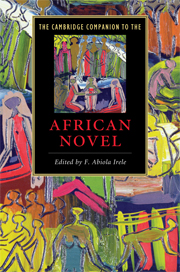Book contents
- Frontmatter
- 1 Introduction: perspectives on the African novel
- 2 The oral-literate interface
- 3 Chinua Achebe and the African novel
- 4 Protest and resistance
- 5 The Afrikaans novel
- 6 The African novel in Arabic
- 7 The francophone novel in North Africa
- 8 The francophone novel in sub-Saharan Africa
- 9 The African historical novel
- 10 Magical realism and the African novel
- 11 The African novel and the feminine condition
- 12 Autobiography and Bildungsroman in African literature
- 13 The postcolonial condition
- 14 New voices, emerging themes
- 15 The critical reception of the African novel
- Bibliography
- Index
2 - The oral-literate interface
Published online by Cambridge University Press: 28 January 2010
- Frontmatter
- 1 Introduction: perspectives on the African novel
- 2 The oral-literate interface
- 3 Chinua Achebe and the African novel
- 4 Protest and resistance
- 5 The Afrikaans novel
- 6 The African novel in Arabic
- 7 The francophone novel in North Africa
- 8 The francophone novel in sub-Saharan Africa
- 9 The African historical novel
- 10 Magical realism and the African novel
- 11 The African novel and the feminine condition
- 12 Autobiography and Bildungsroman in African literature
- 13 The postcolonial condition
- 14 New voices, emerging themes
- 15 The critical reception of the African novel
- Bibliography
- Index
Summary
Since at least the first half of the twentieth century when intellectuals from Africa and the black diaspora began to fashion an international voice that affirmed the comprehensive humanity of black peoples, the issue of orality and its correlate, literacy, has been of central importance. Today the orality–literacy dyad is a central trope in the work of artists and a recurrent category in analyses of African literatures. Based on statistical estimates regarding levels of literacy and formal education in contemporary Africa, it is safe to say that a majority get their intellectual sustenance and spiritual leisure from orally transmitted media rather than the culture of print. This fact gives considerable weight to the view of commentators who assign paradigmatic centrality to the domain of orature in African societies. Moreover, many influential writers acknowledge the importance of orature as background and context of their creative work within the culture of print. The oral–literate dyad invites our attention, then, as the site of deep existential investment for African peoples, and an analytical category in literary studies. A certain relationship to the domain of orality also governs established accounts of the emergence of the novel in Western European literary history. In this account, the novel “evolved” as a literate mode from the domain of orature – the domain, in other words, of folklore, epic, and romance. Versions of this understanding of the origins of the European novel can be found in theorists ranging from Ian Watt to the early Georg Lukács and Michael McKeon.
- Type
- Chapter
- Information
- The Cambridge Companion to the African Novel , pp. 15 - 30Publisher: Cambridge University PressPrint publication year: 2009
- 1
- Cited by

